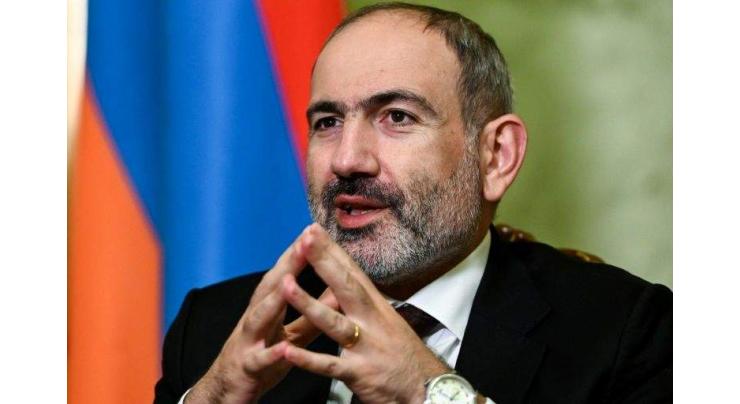
Armenia Prime Minister Pashinyan: From Protest Hero To War Traitor
Umer Jamshaid Published February 25, 2021 | 10:56 PM

Four months after Armenian Prime Minister Nikol Pashinyan sparked outrage at home by ordering his army to end fighting against Azerbaijan, his own military commanders have now turned against him
Yerevan, (APP - UrduPoint / Pakistan Point News - 25th Feb, 2021 ):Four months after Armenian Prime Minister Nikol Pashinyan sparked outrage at home by ordering his army to end fighting against Azerbaijan, his own military commanders have now turned against him.
The former newspaper editor and self-styled man of the people called for his supporters to rally Thursday on the capital Yerevan's streets to buttress his embattled rule, after he fired his army's leadership for demanding his resignation and mounting a "military coup".
"The situation is tense, but we must agree that there cannot be clashes," he shouted into a megaphone as he marched with his backers.
The army's demand for Pashinyan to step down is the climax of months of simmering protests that erupted after he agreed a Moscow-brokered peace deal with Azerbaijan to end six weeks of fighting over the disputed Nagorno-Karabakh region.
His decision to end fighting with Armenia's decades-old foe and cede territory to it was seen as a humiliation at home and has dented Pashinyan's reputation as a reformer of the ex-Soviet country.
He swept to power with a promise of change, spearheading a wave of peaceful protests in 2018 against corrupt post-Soviet elites.
Despite having control of parliament and enjoying significant support from the population, his critics are now calling him a traitor and Armenia's main opposition party has given him an ultimatum to step down to "avoid bloodshed".
Two years ago crowds of villagers greeted Pashinyan, 45, as a hero, offering him fresh bread and berries as he spearheaded the historic protest movement.
He walked hundreds of kilometres across the country, slept in the open, clambered onto the roofs of garages and stood on benches to deliver speeches.
Weeks of mass popular protests forced veteran leader Serzh Sarkisian to resign after a decade in power and Pashinyan was elected prime minister in May 2018.
In power, he launched a crusade against corruption, initiated sweeping economic reforms and sidelined corrupt oligarchs and monopolies.
Analysts credited the policies with helping to accelerate economic growth, reduce poverty rates and create tens of thousands of new jobs.
- Tough-talking commander - But then the coronavirus pandemic struck, followed by the outbreak of fighting in the decades-long dispute with Azerbaijan for the control of the mountainous Nagorno-Karabakh region.
For three decades, the two were locked in a conflict over the province in Azerbaijan which broke away from Baku in the 1990s war that left 30,000 people dead.
Fighting erupted again in late September sparking allegations of war crimes and claiming more than 6,000 lives.
A polished politician with a soft handshake, the war saw Pashinyan transform himself into a tough-talking commander-in-chief.
As fighting raged and Azerbaijan steadily gained territory, he called on Armenians to "unite and break the enemy's backbone" while his wife and son went to the front.
When it was clear Armenia could not emerge victorious, he described signing the Russia-brokered ceasefire as "unspeakably painful for me personally and for our people".
In response, protesters stormed parliament and government headquarters demanding Pashinyan's resignation -- a move analysts said would ultimately bring an end to Pashinyan's career.
The prime minister was born in 1975 in the small resort town of Ijevan in northern Armenia. He studied journalism at Yerevan State University but was expelled in 1995.
He worked as a reporter and newspaper editor before getting involved in politics.
Pashinyan was previously best known for his role in unrest following the 2008 presidential vote that first brought Serzh Sarkisian to power, when 10 people died in clashes between police and supporters of the defeated opposition candidate.
Authorities at the time accused Pashinyan of seeking to seize power and provoking mass riots. He was arrested in 2009 but released two years later under a prisoner amnesty scheme and elected to parliament the next year.
Related Topics
Recent Stories

Malala expresses unwavering support for Gaza people

Selection committee dissolved over Pakistan women cricket team's poor performanc ..

Punjab CM Maryam Nawaz in police uniform at Chung police center

Currency Rate In Pakistan - Dollar, Euro, Pound, Riyal Rates On 25 April 2024

Today Gold Rate in Pakistan 25 April 2024

Mired in crisis, Boeing reports another loss

Session Awarding Ceremony 2024 held at Cadet College Muzaffarabad

Austrian ski great Hirscher to make comeback under Dutch flag

Pakistan, Japan agrees to convene 'Economic Policy Dialogue'

FM Dar conveys deepest sympathy on torrential rains devastation in UAE

Spain PM Sanchez says weighing resignation after wife's graft probe

Tennis: ATP/WTA Madrid Open results - 1st update
More Stories From World
-
Blades of Paris landmark Moulin Rouge windmill collapse
4 minutes ago -
As 'news deserts' spread, US journalism fights on
4 minutes ago -
Blades of Paris landmark Moulin Rouge windmill collapse
24 minutes ago -
Car giants vie for EV crown at Beijing's Auto China show
35 minutes ago -
Blades of Paris landmark Moulin Rouge windmill collapse
44 minutes ago -
Advanced 5G base station launched in Mt. Qomolangma
44 minutes ago
-
China committed to supporting Zimbabwe's innovation-driven development
55 minutes ago -
Myanmar to hold 59th gems emporium next month
1 hour ago -
Digital economy contributes 8.4 pct to Philippine economy in 2023
1 hour ago -
China committed to supporting Zimbabwe's innovation-driven development
1 hour ago -
Starfish control program improving health of Australia's Great Barrier Reef: report
1 hour ago -
Pakistan calls for addressing development changes at a key UN meeting
2 hours ago